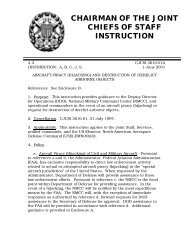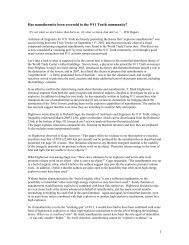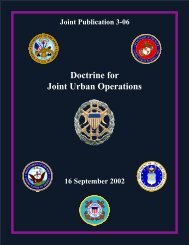illicit drug use in the eu: legislative approaches - EMCDDA - Europa
illicit drug use in the eu: legislative approaches - EMCDDA - Europa
illicit drug use in the eu: legislative approaches - EMCDDA - Europa
You also want an ePaper? Increase the reach of your titles
YUMPU automatically turns print PDFs into web optimized ePapers that Google loves.
<strong>EMCDDA</strong> <strong>the</strong>matic papersIllicit <strong>drug</strong> <strong>use</strong> <strong>in</strong> <strong>the</strong> EU: <strong>legislative</strong> <strong>approaches</strong>National <strong>drug</strong> <strong>use</strong> legislation across <strong>the</strong> European Union‘Depenalisation’ and ‘decrim<strong>in</strong>alisation’: semantic considerationsThe issues of ‘depenalisation’ and ‘decrim<strong>in</strong>alisation’ of <strong>the</strong> <strong>use</strong> of <strong>drug</strong>s or <strong>the</strong>ir possession forpersonal <strong>use</strong> has lately received considerable media attention, <strong>in</strong> particular with <strong>the</strong> announcementof amendments or proposed amendments to legislation <strong>in</strong> some European countries.However, despite <strong>the</strong> plethora of literature on <strong>the</strong> subject, it is difficult to f<strong>in</strong>d a precise, validatedscientific def<strong>in</strong>ition of <strong>the</strong>se two terms, and <strong>in</strong> particular one that is universally shared. This factmay underlie much of <strong>the</strong> confusion observed. Before describ<strong>in</strong>g <strong>the</strong> legal position on <strong>the</strong> <strong>use</strong>of <strong>drug</strong>s and/or <strong>the</strong>ir possession for personal <strong>use</strong> <strong>in</strong> <strong>the</strong> various EU countries, we <strong>the</strong>reforeconsidered it desirable to adopt a conventional def<strong>in</strong>ition of <strong>the</strong>se two terms. For this purpose weanalysed a number of specialised documents <strong>in</strong> <strong>the</strong> literature and consulted several professionalsand academics. The follow<strong>in</strong>g def<strong>in</strong>itions are a syn<strong>the</strong>sis of <strong>the</strong> various contributions. While notlay<strong>in</strong>g claim to an exhaustive treatment of <strong>the</strong> subject or to hav<strong>in</strong>g reached def<strong>in</strong>itive conclusions,we feel that our analysis of some of <strong>the</strong> relevant literature, toge<strong>the</strong>r with <strong>the</strong> consultation ofspecialists ( 38 ), enables us to put forward <strong>the</strong> follow<strong>in</strong>g tentative def<strong>in</strong>itions.Accord<strong>in</strong>g to our convention ‘decrim<strong>in</strong>alisation’ comprises removal of a conduct or activity from<strong>the</strong> sphere of crim<strong>in</strong>al law. Prohibition rema<strong>in</strong>s <strong>the</strong> rule, but sanctions for <strong>use</strong> (and its preparatoryacts) no longer fall with<strong>in</strong> <strong>the</strong> framework of <strong>the</strong> crim<strong>in</strong>al law (elim<strong>in</strong>ation of <strong>the</strong> notion ofa crim<strong>in</strong>al offence). This may be reflected ei<strong>the</strong>r by <strong>the</strong> imposition of sanctions of a differentk<strong>in</strong>d (adm<strong>in</strong>istrative sanctions without <strong>the</strong> establishment of a police record – even if certa<strong>in</strong>adm<strong>in</strong>istrative measures are <strong>in</strong>cluded <strong>in</strong> <strong>the</strong> police record <strong>in</strong> some countries, such as France), or<strong>the</strong> abolition of all sanctions. O<strong>the</strong>r (non-crim<strong>in</strong>al) laws can <strong>the</strong>n regulate <strong>the</strong> conduct or activitythat has been decrim<strong>in</strong>alised.Accord<strong>in</strong>g to our convention ‘depenalisation’ means relaxation of <strong>the</strong> penal sanction providedfor by law. In <strong>the</strong> case of <strong>drug</strong>s, and cannabis <strong>in</strong> particular, depenalisation generally signifies<strong>the</strong> elim<strong>in</strong>ation of custodial penalties. Prohibition rema<strong>in</strong>s <strong>the</strong> rule, but imprisonment is no longerprovided for, even if o<strong>the</strong>r penal sanctions may be reta<strong>in</strong>ed (f<strong>in</strong>es, establishment of a policerecord, or o<strong>the</strong>r penal sanctions).Notwithstand<strong>in</strong>g <strong>the</strong> need for a conventional def<strong>in</strong>ition, it must be acknowledged that <strong>the</strong>adoption of this phras<strong>in</strong>g, with its orig<strong>in</strong>s <strong>in</strong> <strong>the</strong> English language, may add to <strong>the</strong> confusion of,say, <strong>the</strong> Italians, French or Spanish, <strong>in</strong> whose mo<strong>the</strong>r tongues <strong>the</strong> term ‘depenalisation’ generallymay denote what we have just def<strong>in</strong>ed as ‘decrim<strong>in</strong>alisation’.Some national situations cannot be neatly accommodated <strong>in</strong> ei<strong>the</strong>r of <strong>the</strong>se two def<strong>in</strong>itions as <strong>the</strong>follow<strong>in</strong>g presentation shows.( 38 ) H. Albrecht, Y. Bisiou, S. Broshu, M.L. Cesoni, A. Decourrière, K. Krajeswski, B. De Ruyver and E. S<strong>in</strong>gle allcontributed with <strong>in</strong>terpretations of <strong>the</strong>se two terms.12






